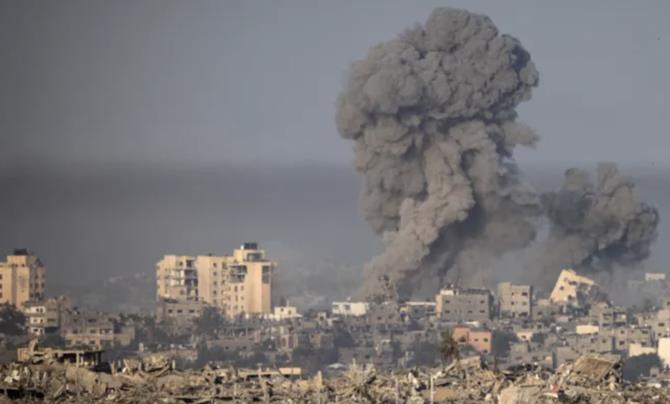
The Taliban has launched a major attack on Lashkar Gah, the capital of Helmand province, calling into question the progress being made on peace talks between the militants and the Afghan government.
Across Helmand and the neighboring region, communications networks are down. Thousands of people are without electricity after an attack on a power station. An estimated 35,000 people have been forced out of their homes by the fighting.
Thanks to the help of US air strikes, and the gallantry of the Afghan security forces, the attack has so far been repelled. However, it remains to be seen how this attack will impact the intra-Afghan talks currently taking place.
One thing that is clear is that after the recent attack in Helmand something has to change if progress on the peace talks is going to be made. Recognizing this, the US special envoy Zalmay Khalilzad said: “Following several meetings Gen. Miller and I had with the Taliban, we agreed to re-set actions by strictly adhering to implementation of all elements of the US-Taliban Agreement and all commitments made.” If progress is not shown with this “reset” then US patience might run out.
Of course, all of this is taking place against the backdrop of US domestic politics. President Donald Trump has promised to end America’s “forever wars” but has had little success in doing so. Consequently, mixed messages are coming from Washington, which allows the Afghan government, the Taliban and America’s allies and adversaries in the region to hear that they want to hear. On one hand, Trump suggested in a recent tweet that US forces would be completely out of Afghanistan by Christmas. This led to what was seemingly an endorsement by the Taliban for President Trump’s re-election bid. However, other senior US officials have suggested that troops will not be out of Afghanistan by Christmas. This current situation is reminiscent of US policy in Syria one year ago, when Trump tweeted out that US troops were leaving the country. One year later, they are still there.
The current situation in Helmand raises two important points. First, it is indicative of the long-term problems Afghanistan will face even if a peace agreement is made with the Taliban. Located in Afghanistan’s south and sharing a border with Pakistan, Helmand province has long been a hotbed of Taliban activity and Pashtun nationalism. It has also been the location of some of the fiercest fighting in the country over the years. At the height of the fighting in 2010-11, the US and the British together had more than 30,000 troops based there. Even though the province itself accounts for only 3 percent of Afghanistan’s total population, these 30,000 troops accounted for almost a quarter of coalition forces in the country at the time. It is hard to believe that any peace deal in faraway Doha will trickle down to the remote villages of a place like Helmand province.
Consequently, mixed messages are coming from Washington, which allows the Afghan government, the Taliban and America’s allies and adversaries in the region to hear that they want to hear
Luke Coffey
In many ways the situation in Helmand is a sober reminder that for the foreseeable future — at least for a generation — there will be some level of insurgency in some parts of the country, no matter what the two sides agree in Doha. After all, India, the world’s largest democracy, still fights multiple insurgent groups inside its borders today. There is no reason to expect that all the fighting will end in Afghanistan just because there may someday be an agreement. This is not necessarily a sign of failure, but more an indication of the complex reality on the ground in Afghanistan. Public opinion needs to be prepared for this eventuality.
Second, the fighting in Helmand, occurring in the midst of ongoing talks, also makes one wonder how much authority the Taliban negotiating in Doha has over the movement on the ground. What was once a very centralized and top-down organization in the 1990s has over the years transformed into a more decentralized and in some cases localized insurgent movement. One of the biggest questions surrounding the peace initiative is if the Taliban negotiating from the comfort of luxurious hotels in Doha have the authority, or at least the influence, over the foot soldier living poorly in a place like Musa Qala.
Admittedly, even before this attack in Helmand little progress had been made. While getting the warring parties around the same table to talk is in itself an achievement, the intensity of the fighting has not reduced across much of Afghanistan in any meaningful way. Thousands of Afghan security forces have been killed by the Taliban this year. There remains a general lack of trust and confidence between all sides. Until this changes, any enduring and meaningful prospects for peace will remain elusive.
Even with all of these challenges the international community should not give up. Strategic patience is required in the face of tactical setbacks. There will be ups and downs throughout the talks. The talks themselves will last months and maybe years. Sadly, many more Afghans will die, and many more will suffer. But an enduring and genuine peace between the Afghan government, Afghan civil society, and the Taliban is the only thing that can bring stability to a country that has suffered from four decades of fighting.
• Luke Coffey is Director of the Douglas and Sarah Allison Center for Foreign Policy at the Heritage Foundation. Twitter: @LukeDCoffey.
Disclaimer: Views expressed by writers in this section are their own and do not necessarily reflect Arab News" point-of-view












